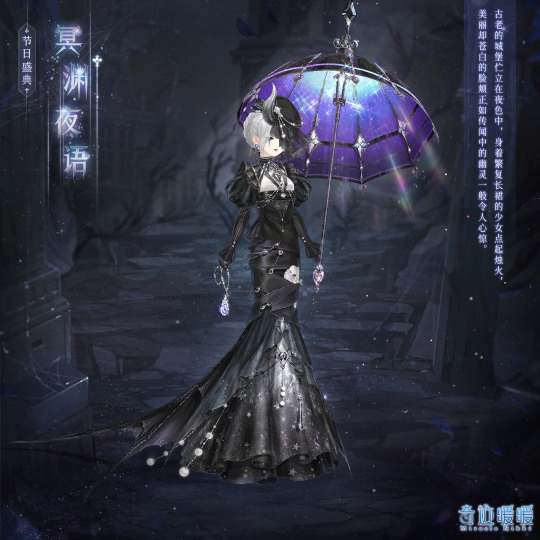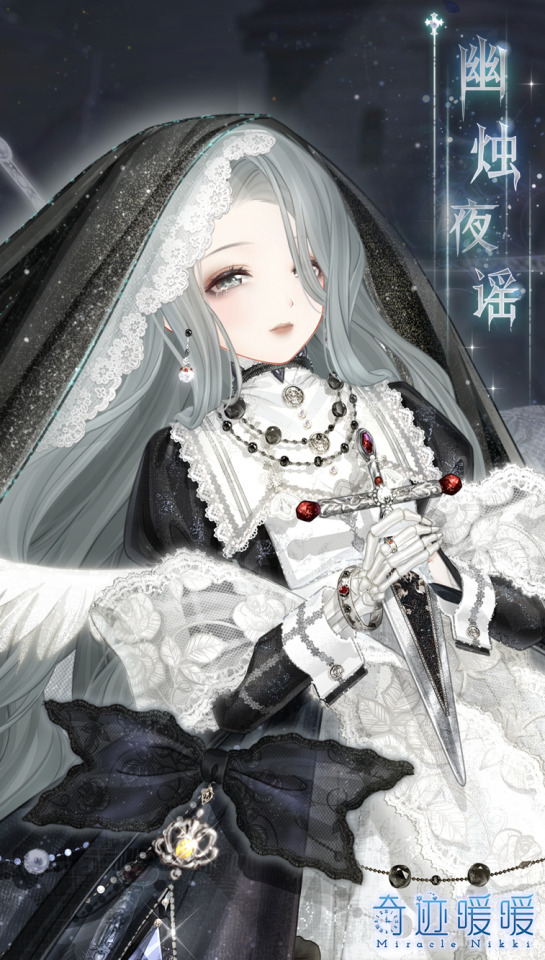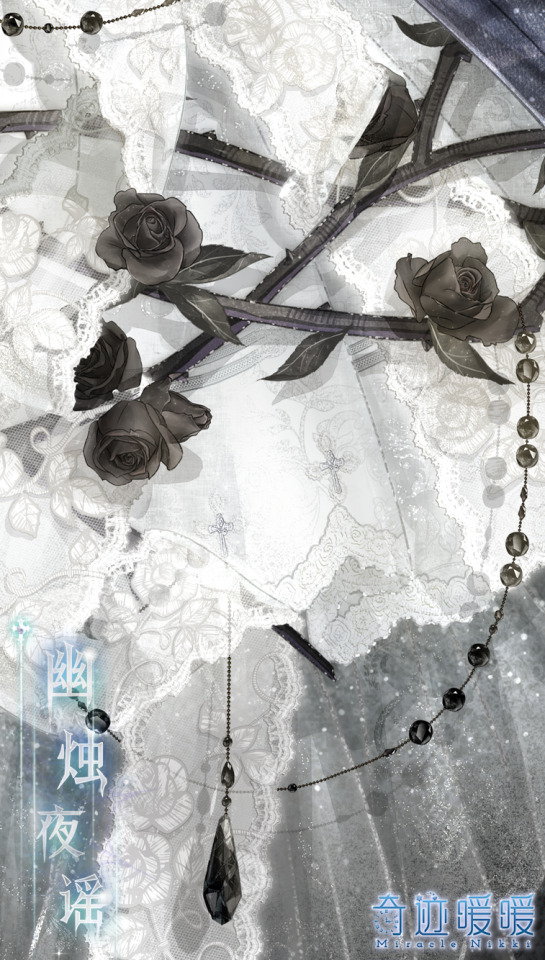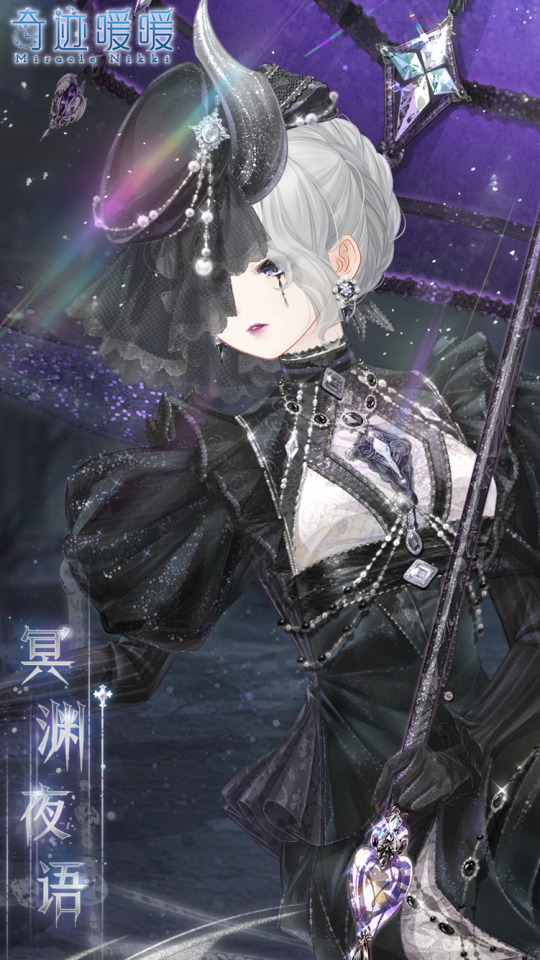Chained to thorny roses, she can only dream about the short youth when she creates her own 'truth' in the nights.
Last active 60 minutes ago
Don't wanna be here? Send us removal request.
Text









New event suits, it appears to be the 2v2 format
97 notes
·
View notes
Text
Hi my name is Ebony Dark’ness Dementia Raven Way and I have long ebony black hair (that’s how I got my name) with purple streaks and red tips that reaches my mid-back and icy blue eyes like

79 notes
·
View notes
Text

The LGBTQ+ Love Nikki character of the day is: Wicked Witch, who is trans!
Requested by anon!
23 notes
·
View notes
Photo

Nikki from Love Nikki Dress Up Queen is going to super hell for gay crimes!!!
requested by: Anonymous
276 notes
·
View notes
Text
O CHRISTMAS TREE O CHRISTMAS TREE

Honestly all I wanted was an actual Christmas tree background item...and the devs gave us this 🤭
73 notes
·
View notes
Text
Hello gaymers, I am back. I deleted my last tumblr on accident like a dumbass and I had 100 followers so f for me I guess
54 notes
·
View notes
Note
What are some typical accessories that can be worn with hanbok? Things like head pieces/hair pins, jewelry, handhelds, etc
Excellent question! As usual, I’ll be focusing on women’s dress during the Joseon dynasty, as that’s my particular area of interest, and will include examples and analysis of Love Nikki’s hanbok suits throughout. If you’re interested in a more comprehensive breakdown of hairstyles and headwear not restricted by Tumblr’s image limit, I would recommend this article.
General accessories

A common accessory carried with hanbok is a hand fan with the tricolor taegeuk, a variant of the same symbol that appears on the South Korean flag, and which is often used as a Korean cultural symbol. These are stiff and somewhat resemble Chinese women’s fans; folding fans, as seen in China and Japan, were not used natively in Korea. One of these fans appears in the suit Colorful Snow Wishes; I also own one irl, which looks basically identical to the image on the left.

Norigae are detachable ornaments which can be used to decorate the coat strings of the jeogori (jacket) or the waist of the chima (skirt). These would be used by women of any social class. As well as being fashionable, they were also thought to act as good-luck charms; different designs might incorporate animals, characters, or other significant symbols which would invoke different concepts. Several Love Nikki suits include norigae; I’ve only included pictures of the ones easiest to see.
Hair ornaments and headdresses
Since you’re specifically asking for hanbok accessories, and since I’m already fighting the image limit as it is, I’m not going to focus much on hairstyles—as a general rule, they get bigger and more elaborate the farther up you go on the social ladder, much like hanbok itself. There also just isn’t a great variety of styles represented in Love Nikki’s hanbok suits anyway. Again, this is a good article if you’re curious to learn more about that.

Daenggi are Korean hair ribbons, which take a variety of forms throughout a variety of hairstyles. The simplest daenggi were used by working-class women; Dawn in the Valley’s hairstyle, with the daenggi at the end of her braid, was common for young girls who were not yet married, though they were usually red. Larger, patterned daenggi were worn with bridal costume; these have several names depending on the style and the way they were worn. Aristocratic women would also use daenggi to decorate their hairstyles among other accessories; Elegant Hibiscus is a good example of this.

Binyeo are hairpins, which was used by married women to hold their hairstyles in place (they’re not chopsticks!). The ends had different shapes by class; royal women’s binyeo took the shapes of dragons and phoenixes, while common women’s binyeo took the shapes of flowers and trees. The binyeo present in Love Nikki all appear to have floral or tree branch ends irregardless of class, though I may be wrong, as the details of the suits are quite small and I may not be seeing them right.

Baetssi are hair ornaments worn on the front of the hair. These were usually secured with strings, though modern adaptations, like the one I own, will sometimes use a headband. These were worn by young girls; confusingly, Janggu Forever and Silk Aroma wear both this and binyeo, despite the fact that binyeo were only worn by married women. The only possible explanation I can think of is that the designers mixed baetssi up with jokduri, another accessory worn on the front of the hair, which I’ll discuss more below.

Jeonmo are paper hats which were worn by kisaeng, the class of female entertainers and courtestans. I’ve already determined that both Fallen Butterfly and Jade Orchid are meant to depict such women in my first hanbok post; because of this, I assume their hats are based on jeonmo, though they’re not tilted in the way they’re supposed to be. Fallen Butterfly’s hat in particular seems to be an odd hybrid of jeonmo and noeul, another style I’ll talk about later.

Tteoljam are the ornaments which were used to decorate wigs and other hairstyles among the kisaeng and upper class; they were made of precious metals in a variety of forms and styles. They were also sometimes called tteolbinyeo. Fallen Butterfly and Elegant Hibiscus both wear these, though their respective hairstyles are different.

Gache are wigs which were worn by both kisaeng and noblewomen. They were usually styled asymmetrically into braids and fastened over the real hair, and decorated with daenggi, binyeo, and tteoljam. The sheer size and weight of gache could be downright dangerous for the health of the women wearing them; because of this, in the late 18th century, they were banned by the king for use among the aristocracy. They still remained popular with kisaeng for some time after that, while aristocratic women started to wear jokduri instead.

Tteoguji is a wooden frame used in the making of the tteoguji meori hairstyle, which was reserved for the highest-ranking women of the court. It also developed as an alternative to gache, as the wood was actually lighter than the full wigs, which were made of real hair. In the middle is Empress Myeongseong (1851-1895) of Korea wearing it with binyeo and daenggi; on the right is the suit Elegant Hibiscus, which also uses tteoljam accessories.

These are a few more headpieces which don’t appear in Love Nikki at all, but which I thought were worth mentioning. The first is jokduri, a type of small hat worn at the front of the head, which aristocratic women started to wear after gache was outlawed, and which was also worn by common women with bridal dress. This is what I’m guessing the suit designers may have meant to put on Silk Aroma, though they ended up giving her baetssi instead. The second is noeul, a type of veiled hat worn by noblewomen; the sheer silk was meant to help hide their faces from men, which I can’t exactly blame them for. Lastly, daesu was the crown worn only by the very highest royal women, the queens and princesses consort. While I of course love Elegant Hibiscus’s tteoguji meori hairstyle, I think this would look incredible in the Love Nikki artstyle, as would the rest of these.
That’s all I’ve got this time around. Thanks for reading!
49 notes
·
View notes
Text
A general overview of what’s going on with Shining Nikki right now (please correct me if I’ve gotten any of this wrong, as I don’t want to spread misinformation):
A set of suits based on traditional Korean court dress was released. In the marketing for this event, it was presented as a part of Chinese culture.
Devs pulled the suits when this was criticized, but defended their decision by saying that Korean traditional dress (hanbok) was historically “learned” from Chinese court fashion, and that it’s their responsibility as a Chinese game to celebrate Chinese culture and history.
While it is true that Chinese classical dress influenced Korean classical dress, they are very much different things from different cultures. The Korean player base continued to criticize the Chinese government and Paper Games for spreading lies on their behalf, though the suits had already been pulled and the developers were working to fix the problem.
Paper Games announced that they would completely shut down the Shining Nikki Korean server in a month, though the server has only been active for a few days. Many players are now boycotting all of the company’s other games as well.
The other Shining Nikki servers are still up; however, this may delay SN coming to the west. If and when we do get a western server, these suits will most likely not be on it.
165 notes
·
View notes




































